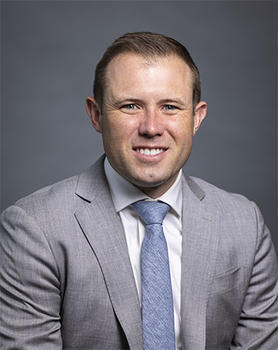Steve Maex, an assistant professor of accounting at George Mason University School of Business, recently received the American Accounting Association (AAA)’s Outstanding International Accounting Dissertation Award.
The International Accounting Section of the AAA seeks to be “the sought-after partner for thought leadership on international accounting related issues” and “serve as a point of entry into AAA for international faculty and doctoral students,” according to the group’s website.
The Outstanding International Accounting Dissertation Award for 2023 was open to doctoral dissertations on topics related to international accounting that were successfully defended during the 2022 calendar year.
The winning dissertation, “Modern Privacy Regulation, Internal Information Quality, and Operational Efficiency: Evidence from the General Data Protection Regulation,” examines the business impact of the European Union’s sweeping 2016 laws on data privacy.

Maex’s choice of topic was influenced by his professional experience as an IT auditor and data analytics specialist at KPMG LLP, prior to pursuing a PhD in accounting from Temple University.
As he tells it, “I was thinking back to experiences consulting with clients faced with prospects of needing to comply not only with this EU-focused regulation, but by similar privacy regulations under consideration by some U.S. states–California in particular.”
Unsurprisingly, corporate leaders mainly viewed the prospect of impending legislation in terms of its challenges and costs. For example, in its 2018 10-K filing with the SEC, Alphabet cited the “substantial costs” of GDPR compliance and opined that “it is possible that despite our efforts, governmental authorities or third parties will assert that our business practices fail to comply.”
To Maex, however, here was an impetus for firms to finally get the data side of their business under control. “At the time, we were advising clients to use this opportunity to implement a governance program over their information that would allow for compliance with privacy regulations while also allowing for other strategic benefits,” he says. This course of action would allow firms to “fully grasp what data and information they held and take the steps necessary to manage their information risks.”
Maex hypothesized that as companies improved the quality of their internal information as a result of GDPR compliance, they would increase their operational efficiency. In other words, they would be able to make smarter resource allocation decisions.
And that is indeed what Maex found after identifying U.S.-based firms with exposure to GDPR and tracking their internal information quality and operational efficiency using widely accepted proxies from prior literature. “The quality of affected firms’ information appears to have improved bringing with it operational benefits,” Maex summarizes.
GDPR still appears to have had a negative net effect on operational efficiency, likely due to the catch-up costs involved in compliance with such sweeping regulations. But in the long run, Maex anticipates that these costs may be offset by the benefits borne by improved information quality.
Maex suggests that since stricter privacy regulations–for most of the world’s population, anyway–appear to be a fait accompli, the only choice companies have is whether to take a purely box-ticking approach to compliance or to make broader investments that would withstand the evolving regulator landscape.
Regarding the dissertation award, which was presented at the AAA annual meeting in August, Maex has words of fulsome thanks for his PhD advisors, Jagan Krishnan and Jayanthi Krishnan, at Temple University. “The dissertation process can be a lonely endeavor without the support of those that assist and motivate along the way. I was lucky to have two advisors, and a broader dissertation committee, from which I benefited immensely, and without which, I would not have been able to bring the dissertation to fruition,” he says.
“It’s an incredible honor to receive such an award,” Maex further states. “When you consider the other papers and authors that have received this award in the past, it’s humbling to be in their company.”
